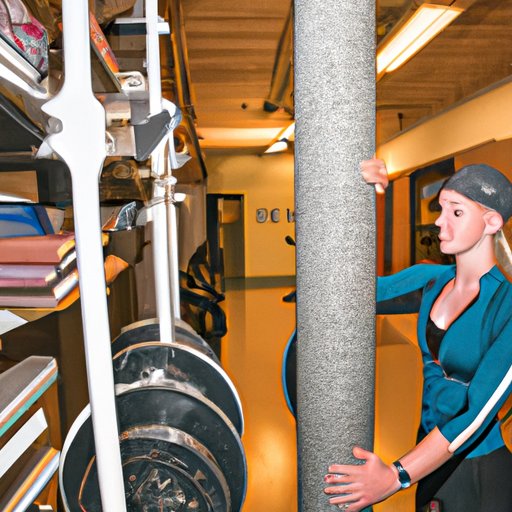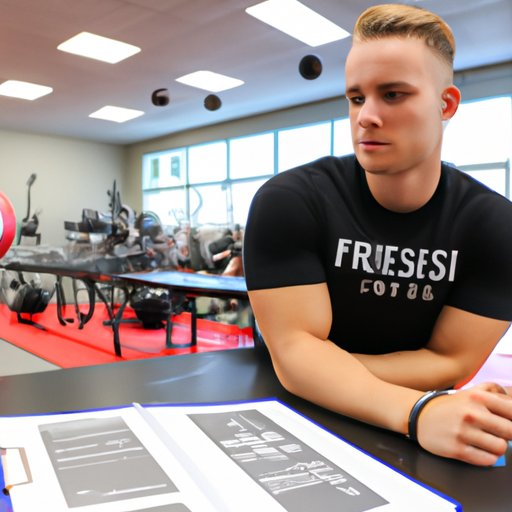Introduction
An exercise science degree is a field of study that focuses on understanding how physical activity impacts the body’s health, performance and well-being. Exercise science majors learn about physical fitness, nutrition, biomechanics, anatomy and physiology. With this knowledge, graduates often pursue careers in health-related fields, such as physical therapy, occupational therapy, sports medicine and strength and conditioning.
The job market for exercise science majors is steadily growing. According to the Bureau of Labor Statistics, employment of physical therapy assistants is projected to grow 27 percent through 2026, while employment of physical therapists is projected to grow 28 percent during the same period.
Job Opportunities for Exercise Science Majors
Exercise science majors have a variety of job opportunities available to them. From working in the fitness industry to becoming a strength and conditioning coach, there are many potential career paths for graduates with an exercise science degree.
Working in the Fitness Industry
Exercise science majors can find work in the fitness industry, either as trainers or in management roles. Trainers are responsible for designing exercise programs for clients and providing guidance on proper form and technique. They may also provide nutritional advice and lifestyle counseling.
Those interested in management roles can pursue positions in gym administration or personal training management. These professionals are responsible for overseeing the daily operations of a gym or fitness facility and ensuring that it runs smoothly.
Becoming a Strength and Conditioning Coach
Strength and conditioning coaches use evidence-based methods to help athletes improve their performance. These professionals design and implement training programs that focus on improving muscular strength, power, endurance, balance and agility.
To become a strength and conditioning coach, individuals must have an exercise science degree and be certified by the National Strength and Conditioning Association (NSCA). The NSCA offers a Certified Strength and Conditioning Specialist (CSCS) certification, which requires applicants to pass an exam and have a minimum of a bachelor’s degree in exercise science.
Preparing to Teach Exercise Science Courses at the College Level
Individuals with a master’s or doctoral degree in exercise science may pursue teaching roles at the college level. These professionals typically teach courses in kinesiology, biomechanics, anatomy and physiology, nutrition, physical education and health promotion.
To become a professor, individuals need to have a doctorate in exercise science or a related field. In addition, they must have extensive knowledge of their subject area and be able to demonstrate effective teaching skills.

Exploring Graduate Programs in Exercise Science
Graduate programs in exercise science provide students with advanced knowledge and skills in areas such as physiology, nutrition, biomechanics and motor behavior. These programs typically include coursework in research methods, applied statistics, exercise prescription and program design.
Students may choose to pursue a master’s degree or doctoral degree in exercise science. Master’s degree programs typically take two to three years to complete, while doctoral programs take four to five years.
Types of Graduate Programs
There are several types of graduate programs in exercise science. Students may choose to pursue a master’s degree in exercise science, kinesiology, physical education or sports medicine. Doctoral programs are available in exercise science and biomechanics, as well as related fields such as nutrition and public health.
Benefits of Pursuing a Graduate Degree
Graduate programs in exercise science provide students with the opportunity to gain advanced knowledge and skills in their chosen field. This can open up new career opportunities, such as teaching at the college level or conducting research in the field of exercise science.
In addition, pursuing a graduate degree can help individuals stand out from the competition when applying for jobs. According to a survey conducted by the National Center for Education Statistics, individuals with a master’s degree or higher earn an average of $12,000 more per year than those with a bachelor’s degree.

Working in the Fitness Industry with an Exercise Science Degree
Exercise science majors can find employment in the fitness industry, either as trainers or in management roles. Trainers are responsible for designing exercise programs for clients and providing guidance on proper form and technique. They may also provide nutritional advice and lifestyle counseling.
Finding Employment in the Fitness Field
Exercise science majors can find employment in the fitness industry in a variety of ways. They can apply directly to gyms and fitness centers, search online job boards, attend job fairs or contact professional organizations for job leads.
In addition, many employers prefer to hire individuals with certifications in personal training or group fitness instruction. The National Strength and Conditioning Association (NSCA) and American Council on Exercise (ACE) offer certifications in personal training and group fitness instruction, respectively.
Different Types of Positions Available
Exercise science majors can find employment in a variety of positions within the fitness industry. These include personal trainers, group fitness instructors, wellness coordinators, fitness directors and gym managers.
Personal trainers are responsible for designing exercise programs for clients and providing guidance on proper form and technique. Group fitness instructors lead classes in areas such as aerobics, yoga, Pilates and kickboxing. Wellness coordinators oversee the overall health and wellness of a facility, while fitness directors manage the day-to-day operations of a gym. Gym managers are responsible for hiring, training and supervising staff members.

Starting a Career in Sports Medicine
Sports medicine is a field of medicine that focuses on treating and preventing injuries related to physical activity. Sports medicine professionals typically work with athletes to diagnose and treat injuries, as well as to develop rehabilitation plans.
Understanding the Requirements for Sports Medicine Professionals
To become a sports medicine professional, individuals must have an exercise science degree and be licensed to practice medicine. The American Board of Medical Specialties (ABMS) offers board certification in sports medicine, which requires applicants to pass an exam and have a minimum of a bachelor’s degree in exercise science.
In addition, sports medicine professionals must possess strong communication and interpersonal skills and be knowledgeable about exercise physiology, nutrition, biomechanics and injury prevention.
Exploring Different Specializations within Sports Medicine
Sports medicine professionals may specialize in a particular area of sports medicine, such as orthopedic surgery, physical therapy, athletic training or nutrition. Orthopedic surgeons specialize in diagnosing and treating musculoskeletal injuries, while physical therapists specialize in developing rehabilitation programs for injured athletes. Athletic trainers specialize in providing preventative care and emergency response, while nutritionists specialize in helping athletes meet their nutritional needs.
Becoming a Strength and Conditioning Coach
Strength and conditioning coaches use evidence-based methods to help athletes improve their performance. These professionals design and implement training programs that focus on improving muscular strength, power, endurance, balance and agility.
Understanding the Role of a Strength and Conditioning Coach
Strength and conditioning coaches work with athletes to create individualized training programs that focus on improving performance. They may also provide nutritional advice, evaluate athletes’ progress and develop team-wide conditioning programs.
In addition, strength and conditioning coaches must possess strong communication and interpersonal skills and be knowledgeable about exercise physiology, nutrition, biomechanics and injury prevention.
Preparing for Certification
To become a strength and conditioning coach, individuals must have an exercise science degree and be certified by the National Strength and Conditioning Association (NSCA). The NSCA offers a Certified Strength and Conditioning Specialist (CSCS) certification, which requires applicants to pass an exam and have a minimum of a bachelor’s degree in exercise science.
Preparing to Teach Exercise Science Courses at the College Level
Individuals with a master’s or doctoral degree in exercise science may pursue teaching roles at the college level. These professionals typically teach courses in kinesiology, biomechanics, anatomy and physiology, nutrition, physical education and health promotion.
Qualifications Needed to Teach
To become a professor, individuals need to have a doctorate in exercise science or a related field. In addition, they must have extensive knowledge of their subject area and be able to demonstrate effective teaching skills.
Teaching experience is also beneficial, as many colleges and universities require professors to have prior teaching experience. Some institutions also require professors to have a background in research and/or publishing.
Developing Expertise in an Area of Exercise Science
Professors should strive to develop expertise in a particular area of exercise science. This can help them stand out from the competition when applying for teaching positions. Individuals may choose to focus on topics such as anatomy, physiology, biomechanics, nutrition or physical education.
In addition, professors should stay up-to-date on the latest research and trends in the field. Keeping abreast of new developments can help them remain competitive in the job market.
Conclusion
Exercise science majors have a variety of job opportunities available to them. From working in the fitness industry to becoming a strength and conditioning coach or preparing to teach exercise science courses at the college level, graduates with an exercise science degree have many potential career paths to explore.
Graduate programs in exercise science provide students with the opportunity to gain advanced knowledge and skills in their chosen field. This can open up new career opportunities, such as teaching at the college level or conducting research in the field of exercise science.
No matter what path they choose, exercise science majors have the potential to make a positive impact on the health and well-being of individuals and communities.
(Note: Is this article not meeting your expectations? Do you have knowledge or insights to share? Unlock new opportunities and expand your reach by joining our authors team. Click Registration to join us and share your expertise with our readers.)
